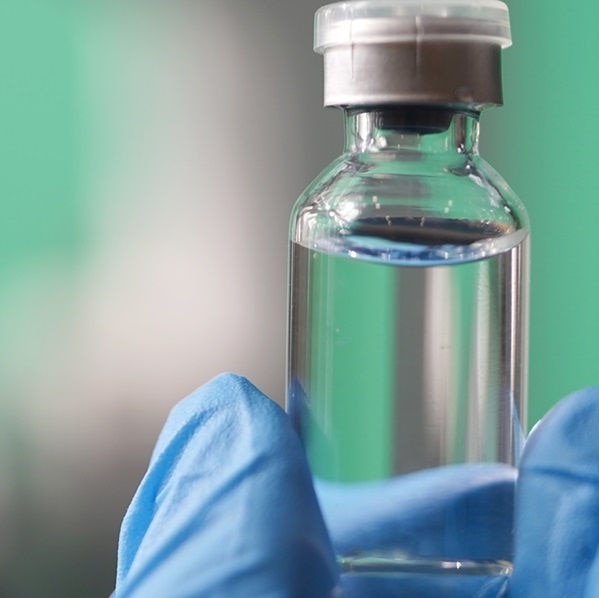News
July 26, 2024
Learn more about dsm-firmenich’s CBD sampling program for early-stage cannabinoid research and development.
Research exploring the use of cannabinoids as a treatment option is growing rapidly. Promising science in the field has already led to the launch of several cannabinoid-based therapies – one being Epidiolex®, an oil-based CBD drug product, approved for the management of treatment-resistant epileptic syndromes in 2018.1,2 Since then, the therapeutic potential of CBD has grabbed the attention of scientific communities worldwide and pre-clinical and clinical research has revealed possible benefits beyond central nervous system (CNS) disorders, with epilepsy as the first proof of therapeutic effect. That said, there is still a lot more to be discovered in this field, requiring further investment in research and access to high-quality CBD-based medicines.
dsm-firmenich now offers a new program to advance cutting-edge science in this space, supplying samples of its GMP quality, CBD pharmaceutical ingredients. These include:
We talked to Zdravka Misic, Innovation Project Manager at dsm-firmenich and program lead, to learn more about why the initiative was launched, who can benefit from it and what new partnerships in this space could mean for the future of CBD research and development.
Understanding of the potential of cannabinoids, particularly CBD, as a therapeutic agent has greatly increased in recent years. Effects of CBD have been explored across a range of treatment areas, from neurological and psychological disorders to pain relief, cardiovascular and gastrointestinal conditions and even in supporting cancer treatment. There are around 150 currently active or upcoming clinical trials registered in the US alone investigating CBD as an intervention or treatment,3 and 34 registered in the EU.4 Roughly a third of these trials relate to the management of chronic pain. Whereas other research projects are studying the role of the molecule in mood and sleep disorders, psychiatric conditions, such as schizophrenia, and CNS disorders like Parkinson’s.5
In terms of pre-clinical research, mechanisms for the therapeutic effects of CBD have been investigated across many indications. For example, CBD has been shown to interact with serotonin receptors, which could mediate effects in multiple conditions, including anxiety.6 Additionally, possible anti-inflammatory and neuroprotective effects have been observed in both cell culture and animal models of Parkinson’s disease.7 While in vitro and in vivo pre-clinical studies focused on cancer have revealed the potential antitumor effects of the drug candidate.8
However, a lot of the underlying biology behind the therapeutic potential of CBD has not yet been fully elucidated or defined, leaving room for more exciting research.
In order to support academics and progress of not-for-profit cannabinoid pre-clinical and early clinical research, we are offering researchers and scientists the opportunity to request a sample of our CBD GMP API and premium formulated CBD drug product intermediate (CBtru®). These ingredients have been manufactured under pharma GMP (ICH Q7) to the highest quality standards, with no batch-to-batch variation and come with complete regulatory dossiers and technical packages. With these samples scientists can move forward with confidence in their materials and de-risk their research programs, increasing the odds of scientific and therapeutic advancements.
Perhaps more importantly, our program also offers academics the unique opportunity to collaborate with our leading team of technical, research and regulatory experts. We’re committed to unlocking the potential of CBD across the pharmaceutical landscape and are excited to partner with likeminded researchers around the world to bring us one step closer towards improving patient health.
The research possibilities with CBD are vast, whether bolstering existing data or exploring new avenues altogether. For example, there is a lot of emerging pre-clinical data supporting a role for CBD in cancer treatment, and a number of clinical trials examining the use of CBD in alleviating anxiety and pain in patients with cancer. However, the anti-tumoral effects of CBD have not yet been examined in controlled clinical trials.8 The use of CBD for pain management in various conditions is another area of interest, with large numbers of studies building on anecdotal evidence. Pain relief is one of the main reasons cited for use of CBD as a health supplement, although these analgesic effects have not yet been fully proven by robust randomized controlled trials, leaving space for exploration.5,9
Another exciting focus of research is the role of CBD in brain diseases and CNS disorders. We are already seeing how cannabinoid-based treatments can improve the lives of patients with difficult to treat CNS disorders, including Epidiolex® for epilepsy and Sativex® (or nabiximols) for the treatment of severe spasticity in multiple sclerosis. 2,10 There are also promising results from early clinical trials of CBD in the treatment of Parkinson’s disease.11, 12 Plus, pre-clinical data indicating that CBD could help to delay the progression of Alzheimer’s disease.13 There is also room to explore the role of CBD, as well as other cannabinoids, in mental health and mood disorders such as anxiety and depression.14 With this backdrop, CBD in the treatment of CNS disorders and brain health is a rich area of research with many questions left to answer.
We are also currently deeply investing in the ability to develop oral solid dosage forms, offering rapid treatment, like orally dispersible tablets (ODTs). The formulation of these novel formats is enabled by CBtru®, our premium formulated CBD drug product intermediate that allows for the exploration of CBD in more acute applications, such as in the treatment of sleep disorders. That’s because CBtru® offers optimized CBD bioavailability and higher API loading to allow for the development of more patient-friendly medicines; representing a new era in cannabinoid-based innovation, which has been limited to oil-based formulations to date.
That said, we want to work with researchers and teams in all areas that have the potential to elevate the health of patients. This includes everything from fundamental research exploring the biology underpinning the effects of CBD, to early-phase clinical studies investigating pharmacokinetic properties of other novel CBD delivery formats.
With dsm-firmenich, you get more than an ingredient provider. In addition to our high-quality CBD portfolio, anyone that collaborates with our team gets the guidance and support of an expert, purpose-led partner, backed up by our globally 2,000 scientists working in formulation, new target and new mode of action development. We can lend our expertise to any stage of research and the drug development journey.
Additionally, as mentioned above, this program offers access to our cutting-edge, first-of-its-kind CBD drug product intermediate. CBtru® is the result of a two-year journey, with the mission to develop solid oral dosage forms with higher API loading and optimized bioavailability. Readers can learn about this process, our capabilities in the cannabinoid research and development space and more in our recent AAPS eCHALK talk.
Finally, I encourage academics interested in advancing their CBD-based research to reach out and submit a sample request. You can learn more about the program by clicking the button below.
[1] Lattanzi, S. et al. (2018). Efficacy and Safety of Cannabidiol in Epilepsy: A Systematic Review and Meta-Analysis. Drugs
[2] Abu-Sawwa, R., & Stehling, C. (2020). Epidiolex (Cannabidiol) Primer: Frequently Asked Questions for Patients and Caregivers. The journal of pediatric pharmacology and therapeutics
[3] clinicaltrials.gov, July 2024
[4] clinicaltrialsregister.eu, July 2024
[5] O'Sullivan, S. E. et al. (2023). The therapeutic potential of purified cannabidiol. Journal of cannabis research
[6] Vitale, R. M. et al. (2021). The (Poly)Pharmacology of Cannabidiol in Neurological and Neuropsychiatric Disorders: Molecular Mechanisms and Targets. International journal of molecular sciences
[7] Peres, F. F. et al. (2018). Cannabidiol as a Promising Strategy to Treat and Prevent Movement Disorders? Frontiers in pharmacology
[8] Ma, L. et al. (2024). Research Progress on the Mechanism of the Antitumor Effects of Cannabidiol. Molecules
[9] Mohammed, S. Y. M. et al. (2024). Effectiveness of Cannabidiol to Manage Chronic Pain: A Systematic Review. Pain Management Nursing
[10] Haddad, F., Dokmak, G., & Karaman, R. (2022). The Efficacy of Cannabis on Multiple Sclerosis-Related Symptoms. Life
[11] Leehey, M. A., et al. (2020). Safety and Tolerability of Cannabidiol in Parkinson Disease: An Open Label, Dose-Escalation Study. Cannabis and Cannabinoid Research
[12] de Faria, S. M. et al. (2020). Effects of acute cannabidiol administration on anxiety and tremors induced by a Simulated Public Speaking Test in patients with Parkinson’s disease. Journal of Psychopharmacology
[13] Xiong, Y., & Lim, C.-S. (2021). Understanding the Modulatory Effects of Cannabidiol on Alzheimer’s Disease. Brain Sciences
[14] Peng, J. et al. (2022). A narrative review of molecular mechanism and therapeutic effect of cannabidiol (CBD). Basic & Clinical Pharmacology & Toxicology.

3 December 2025

21 February 2025

6 December 2024
Customized blends of functional ingredients in one single, efficient premix.
Streamline your product development process and get to market faster.
From trade shows to conferences and other industry events, find out where you can meet us next.
Talking Nutrition, Health & Care
Explore new science, consumer insights, industry news and more in our latest articles.
Discover educational whitepapers, webinars, publications and technical information.
Request samples, place orders and view product documentation.